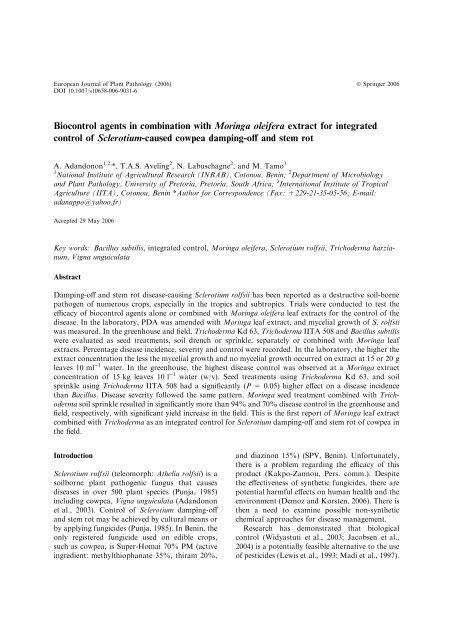
It is estimated that only 10 percent of bioactive molecules have been correlated with metabolic pathways, so there are still plenty of novel biosynthetic pathways to be discovered. Furthermore, there is huge diversity in the types of molecules synthesized by fungi, as individual strains can be considered unique in terms of their chemodiversity. The vast majority of metabolic pathways responsible for the biosynthesis of bioactive molecules in fungi are highly complex and not well understood. Why did you choose this area of research?

We intend to characterize all of the small molecules produced by a potential biocontrol agent by using metabolic engineering techniques to bypass specific environmental conditions. However, it is difficult to know how a biocontrol agent will behave under different environmental conditions or if it produces toxins of its own. An alternative approach is to use a biocontrol agent that protects crops from pathogens without causing damage to the crops, the environment or the consumer. Methods for preventing crop loss include using genetically modified crops or pesticides, with neither being fully accepted by consumers due to safety concerns. Many important crops such as rice, wheat and corn face substantial contamination by fungal pathogens, leading to enormous losses of food stuffs affecting farmers and consumers alike.
#Safe with biocontrol agents full#
My research aims to overcome these unknown controls, using transcriptional regulator manipulation or heterologous expression techniques, so that we can identify the full range of bioactive molecules that a single strain of fungus can produce. This knowledge is fundamental when considering the use of fungi as biocontrol agents against specific plant pathogens, as we need to be certain that no toxic molecules are produced that cause more damage than the pathogen itself. These small molecules are not always observed in a laboratory setting, as they are under tight regulatory control and may require specific environmental cues. View Halo Profile >įungi are prolific producers of bioactive molecules that have potential uses as essential medicines, life-enhancing drugs or agrochemicals.

Elizabeth Skellam is developing methods to synthesize these molecules with hopes of protecting crops from pathogens. To break down the complexity of their metabolic pathways, Dr. Through the bioactive molecules they produce, fungi hold great potential in solving problems across the spectrum, from agriculture to health.


 0 kommentar(er)
0 kommentar(er)
